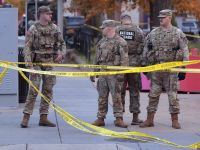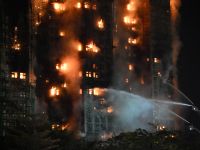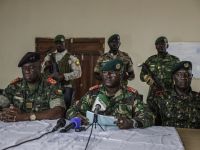The Pentagon is taking steps to prepare for a rapid massing of U.S. forces around Iraq in the weeks ahead, and given the time required to get these forces to the Gulf region, the earliest an attack is likely to come is January, The Washington Post reported Saturday.
"We can do a certain amount of things now that will help shorten the time needed to get everything else in place later," a senior defense official was quoted by the newspaper. "It doesn't mean that we're definitely going to do anything, but it hedges our bets."
Powell, Blix
US Secretary of State Colin Powell said he was confident the UN Security Council would agree on a new resolution demanding Iraqi disarmament as the chief UN arms inspector said his team would welcome a new mandate.
"I think we have an agreement that such a resolution would be useful," Powell said after meeting with Hans Blix, head of the UN Monitoring, Verification and Inspection Commission (UNMOVIC).
"And I think, increasingly, members of the council are coming to the conclusion that such a resolution would be useful," he told reporters.
Powell, however, allowed that disagreements persisted among the Security Council members on whether there should be one resolution that includes an authorization of the use of force against Iraq in the event of non-compliance, or two, as France has proposed.
"We still believe a one-resolution solution is the better way to go," he said, adding that pressure from the international community was the only way to ensure Iraqi compliance.
But, according to AFP, he hinted that there might be room for compromise. "This is a negotiation," he said.
"It's a very complex one, it's a very intricate one," Powell said. "There are 15 Security Council members who have an equity in this. They are all sovereign nations with a point of view and we have to listen to all those points of view and find a way to move forward."
On his part, Blix was non-committal on the question of one or two resolutions. He agreed with Powell that pressure was needed to get Iraq to comply, but would not be drawn when asked his opinion of the diplomatic fight now underway.
"I think it is clear that there has to be constant pressure to keep the Iraqis to comply," Blix said. "Exactly the formulation of that, whether it is one resolution or two, we will leave to (the Security Council)."
But, he said UNMOVIC would "welcome" a new resolution that further clarified its mandate and spelled out in detail what its specific instructions were. "We know from long experience that the devil is in the details and we have been able to clarify quite a number of them," Blix said.
"I think the Security Council resolution that is now being discussed, is one that I think we would welcome, this would further clarify matters," he said.
Bush
Meanwhile, President Bush called Saddam Hussein a "cold-blooded" killer.
In a statement meant to rally the American people to support war, Bush said "for the sake of our freedom, for the sake of peace, if the United Nations won't make the decision, if Saddam Hussein continues to lie and deceive, the United States will lead a coalition to disarm this man before he harms America."
Bush will make a nationwide speech on Iraq from Cincinnati on Monday, the White House said.
Other developments
The CIA, in a report from U.S. intelligence agencies, backed the Bush administration's contention that Iraq had significant caches of dangerous weapons despite numerous international searches.
In a new report, the agencies said Iraq owns biological and chemical weapons and some long-range missiles, but probably no nuclear weapons. "If left unchecked, it probably will have a nuclear weapon during this decade," the unclassified report concluded.
In another development, lawmakers from rival Iraqi Kurdish factions met for the first time in eight years Friday, in a rare show of political unity.
The Kurdistan National Assembly session brought together legislators from the Patriotic Union of Kurdistan and the Kurdistan Democratic Party, as well as representatives of northern Iraq's Christian minority.
The assembly was elected in 1992, but this was the first time the full 105-seat chamber has met since 1994, when political tension between the two parties' leaders exploded into a four-year civil war.
Relations between the two camps have gradually improved since a 1998 U.S.-brokered truce, and the northern area of Iraq that is home to Kurds became relatively safe and prosperous.
The two leaders, Jalal Talabani of the Patriotic Union of Kurdistan and Massoud Barzani of the Kurdistan Democratic Party, sat next to each other Friday in the assembly's cramped chamber.
According to AP, U.S. Secretary of State Colin Powell sent a message commending the Kurdish lawmakers for their show of unity but warning "the road ahead is difficult." "Now that you share the same assembly room, I am sure that you will also share a commitment to the security, prosperity and freedom of all Iraqis both in the home areas you represent and in Iraq as a whole." (Albawaba.com)
© 2002 Al Bawaba (www.albawaba.com)







